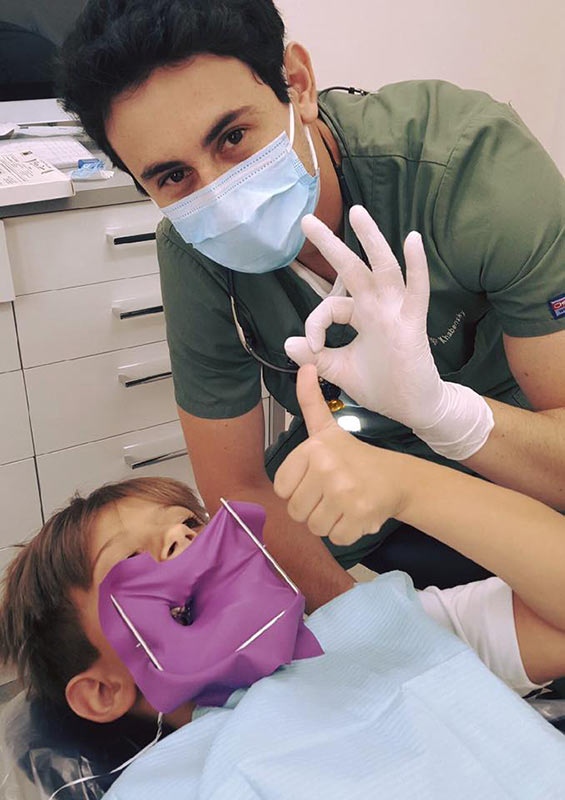Recognizing How Dentists Deal With Usual Oral Health Issues
Dental professionals utilize a complex approach to manage typical oral wellness problems, using diagnostic strategies such as aesthetic assessments and X-rays to find cavities, gum condition, and tooth level of sensitivity. Highlighting preventive treatment, dental professionals also give individualized recommendations on maintaining dental hygiene. Just how precisely do these methods merge to guarantee optimal oral health?
Detecting Cavities
Detecting tooth cavities entails a meticulous examination of the teeth, making use of both visual examinations and advanced analysis devices. Oral professionals start with an extensive aesthetic assessment, looking for discoloration, noticeable holes, or various other indicators of degeneration on tooth surfaces. They might use a dental mirror and traveler to spot soft places or areas that might indicate demineralization.
In addition to aesthetic inspections, dental experts typically employ innovative diagnostic tools to improve precision. Digital radiographs, or X-rays, are fundamental in determining dental caries that are not noticeable to the naked eye, such as those between teeth or beneath existing oral job. These pictures offer thorough understandings into the extent and location of decay, allowing for exact therapy preparation.
Some experts additionally use laser fluorescence devices, which find adjustments in tooth composition by measuring exactly how much light is shown back from the tooth surface area. This approach can identify early-stage cavities that could not yet be obvious or noticeable via typical means. Regular dental check-ups and making use of these diagnostic techniques are essential in catching tooth cavities early, consequently stopping more degeneration and maintaining overall oral health and wellness.
Treating Gum Disease
While discovering cavities is a vital element of oral health, it is just as vital to attend to gum condition, an additional widespread dental issue. Gum disease, or periodontal condition, is mostly triggered by the accumulation of plaque, a sticky film of germs on the gum tissues and teeth. If unattended, it can advance from gingivitis, a moderate type, to periodontitis, a more severe problem that can result in tooth loss and systemic wellness issues.
The first therapy for gum condition commonly includes non-surgical approaches. Scaling and root planing, a deep cleaning treatment, is typically used to eliminate plaque and tartar from beneath the gumline. Antibacterial medications might also be suggested to decrease microbial tons.
For advanced instances, surgical treatments may be essential. Procedures such as flap surgery, where gum tissues are lifted back to get rid of tartar deposits, or bone and tissue grafts, which intend to regenerate broken areas, are utilized to recover oral health and wellness.
Ongoing upkeep is important in managing periodontal condition. Dental practitioners suggest routine oral exams, specialist cleanings, and persistent home care techniques, consisting of brushing, flossing, and making use of antiseptic mouth wash. Early discovery and consistent administration are crucial to avoid the development of this usual yet serious dental condition.
Taking Care Of Foul Breath
Foul breath, also recognized as bad breath, regularly affects individuals and can be a resource of substantial social pain and anxiety. Dental practitioners play a critical role in managing this condition and identifying by recognizing underlying causes and recommending suitable treatments.
The etiology of halitosis is multifactorial, with bad dental health being a key factor. Microbial plaque build-up on the teeth and tongue, food fragments, and dry mouth are common culprits. dentist eugene oregon. Dental professionals typically begin administration by suggesting people on reliable dental hygiene methods, including routine brushing, flossing, and using antiseptic mouth washes

In addition, lifestyle and dietary factors, such as tobacco use and usage of particular foods, might exacerbate foul breath. Dental professionals give customized recommendations on nutritional alterations and cessation of harmful practices. Collaboration with various other medical care carriers may also be warranted if systemic problems, such as gastrointestinal problems or respiratory system infections, are thought contributors to bad breath.
Resolving Tooth Level Of Sensitivity
Resolving dental health and wellness prolongs beyond taking care of halitosis to consist of problems like tooth sensitivity, which can considerably affect daily life. Tooth sensitivity, characterized by discomfort or discomfort in feedback to stimulations such as hot, cold, sweet, or acidic foods and beverages, often arises from revealed dentin or declining periodontals. Dental professionals utilize a diverse approach to take care of and alleviate this condition.
First, a thorough exam is vital to determine the underlying cause, which might range from enamel erosion to gingival economic downturn. Based upon the medical diagnosis, treatment can entail desensitizing agents like fluoride gels or varnishes, which websites reinforce tooth enamel and lower level of sensitivity. Furthermore, dentists might recommend particularly developed toothpaste for delicate teeth, consisting of compounds like potassium nitrate or stannous fluoride to obstruct discomfort signals.

Preventive Dental Care
Recognizing the importance of preventive dental care is important for maintaining long-lasting oral wellness. Preventive care incorporates a variety of practices intended at stopping the start of dental conditions and problems. Regular oral check-ups, commonly recommended every 6 months, are basic to this approach. During these visits, dental professionals execute complete cleanings, eliminating plaque and tartar that are beyond the reach of routine cleaning and flossing.
Furthermore, preventative care consists of the application of fluoride therapies and oral sealants, which supply an added layer of defense against dental cavity. Fluoride reinforces the enamel, making it more resistant to acid assaults, while sealers work as a barrier on the chewing surfaces of the back teeth, where decay usually begins.
Education and learning is a significant part of preventative dental treatment. Dental professionals and hygienists educate individuals on proper cleaning and flossing methods, the relevance of a balanced diet regimen, and the impact of way of living choices such as smoking cigarettes and sugar consumption on oral health and wellness.
Conclusion

Dental practitioners employ a multifaceted approach to handle usual oral wellness concerns, using diagnostic methods such as aesthetic inspections and X-rays to find cavities, gum disease, and tooth level of sensitivity.While detecting tooth cavities is a critical element of dental wellness, it is just as important to resolve gum illness, an additional prevalent dental issue. dentist in eugene oregon. Dental experts may execute a thorough oral examination to determine possible concerns such as gum condition, oral decays, or dental infections. By resolving tooth level of sensitivity comprehensively, dentists help clients accomplish higher comfort and preserve ideal oral health
Emphasizing preventive care and customized recommendations, oral experts play an important role in maintaining optimum dental wellness and mitigating lifestyle-related oral troubles.